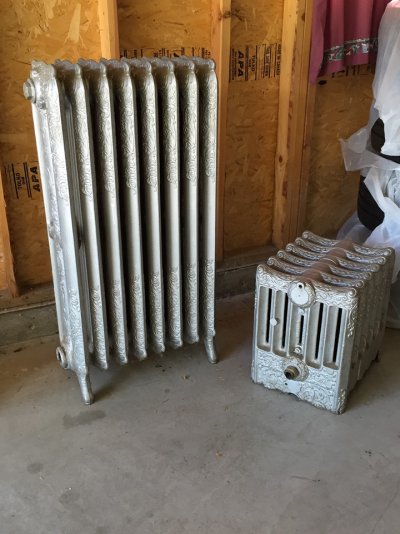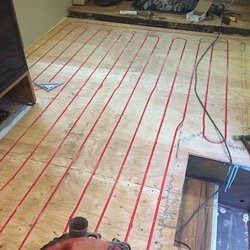DougMorford
Member
My RV, like many, has a central air propane furnace. These furnaces have two problems that make them pretty much garbage for boondocking: 1) the heat exchanger it uses to transfer heat from the combusting propane to the cabin air is extremely inefficient. I think that has mostly to do with it being difficult to transfer heat to air without a lot of surface area. But, the designers of these furnaces put nearly zero thought into the heat exchanger, so the problem is really bad. 2) The furnace uses a 12 volt blower in its operation. This blower realistically gives me only one night of reliable heating before it has drained my battery. I will be installing a second battery and buying a generator for recharging, but it's not the answer for elk hunting trips that last weeks in freezing temps. I need a heating system that uses preferably no electricity, propane efficiently, and operates on a thermostat. I need to be able to leave the trailer unattended for a few days at a time and feel confident that my water system won't freeze. I also want the propane heater to be externally vented because i like being alive, and it's difficult to dry my clothes in 100% humidity.
My idea:
Use a dometic RV hot water heater as a boiler:
https://www.amazon.com/dp/B00TR52GBU/?tag=hearthamazon-20
and old cast iron radiator.
I already have this same water heater for domestic hot water, and it works great. Most importantly it uses zero electricity aside from lighting the flame.
The output from the top of the heater tank would make a short run of a couple feet to the top of a cast iron radiator sitting right next to the water heater, and then the outlet at the bottom of the radiator would feed back to the bottom of the heater. The inlet to the radiator would be controlled by a TRV. A TRV (Thermostatic Radiator Valve) is an adjustable mechanical water valve that opens and closes incrementally based on room temp. A pump would not be needed with such a short run; the heat differential would create a strong flow to and from the radiator and heater. The system would be filled with antifreeze to avoid having to winterize it. A pressure tank would be plumbed in line to deal with pressure in the sealed system, and the pressure relief valve on the water heater would be sufficient for safety as far as pressure is concerned.
I had originally thought that I would install a small wood or pellet stove to deal with electrical usage and humidity issues. Those options aren't reliable enough though since I want to keep my water system going late into the fall, and be able to leave the trailer unattended for a few days at a time. The big hydronic systems for rv's sounded enticing, but they are expensive and still use electricity. A hot water heater is $400, the TRV and all the plumbing will probably be $50, and the radiator can be found for cheap or for free. I'm hoping it will be like having a little stove in the camper, without the mess and hassle.
Please let me know if anyone sees problems here.
Doug
My idea:
Use a dometic RV hot water heater as a boiler:
https://www.amazon.com/dp/B00TR52GBU/?tag=hearthamazon-20
and old cast iron radiator.
I already have this same water heater for domestic hot water, and it works great. Most importantly it uses zero electricity aside from lighting the flame.
The output from the top of the heater tank would make a short run of a couple feet to the top of a cast iron radiator sitting right next to the water heater, and then the outlet at the bottom of the radiator would feed back to the bottom of the heater. The inlet to the radiator would be controlled by a TRV. A TRV (Thermostatic Radiator Valve) is an adjustable mechanical water valve that opens and closes incrementally based on room temp. A pump would not be needed with such a short run; the heat differential would create a strong flow to and from the radiator and heater. The system would be filled with antifreeze to avoid having to winterize it. A pressure tank would be plumbed in line to deal with pressure in the sealed system, and the pressure relief valve on the water heater would be sufficient for safety as far as pressure is concerned.
I had originally thought that I would install a small wood or pellet stove to deal with electrical usage and humidity issues. Those options aren't reliable enough though since I want to keep my water system going late into the fall, and be able to leave the trailer unattended for a few days at a time. The big hydronic systems for rv's sounded enticing, but they are expensive and still use electricity. A hot water heater is $400, the TRV and all the plumbing will probably be $50, and the radiator can be found for cheap or for free. I'm hoping it will be like having a little stove in the camper, without the mess and hassle.
Please let me know if anyone sees problems here.
Doug


